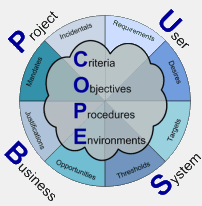Core Performance Testing Principle:
Context
Overview
For a successful performance testing project, both the approach to testing performance and the testing itself must be relevant to the context of the project. Without an understanding of the project context, performance testing is bound to focus on the items that the performance tester or test team assumes must be important as opposed to those that truly are important; frequently leading to wasted time, frustration and conflicts.
The project context is nothing more than those things that are, or may become, relevant to achieving project success. It may include, but is not limited to; the overall vision or intent of the project, performance testing objectives, performance success criteria, the development life-cycle, the project schedule, the project budget, the available tools and environments, the skill set of the performance tester and the team, the priority of detected performance concerns and the business impact of deploying an application that performs poorly.
Sources of Context
Some of the virtually infinate sources of context that is, or at least could be, relevant to a performance testing project include:
Project Vision
Purpose of the System
Customer or User Expectations
Business Drivers
Reasons for Testing Performance
Value Performance Testing Brings to the Project
Project Management and Staffing
Process
Compliance Criteria
Project Schedule
Learn more through PerfTestPlus Training
This topic is covered in the following PTP training courses:
- Scott Barber´s Performance Testing Software Systems: A Heuristic Approach
- Scott Barber's Principles Of Performance Testing (Designed for Managers and Executives)
- Scott Barber´s Performance Testing Software Systems: An Introduction
- Scott Barber's Performance Testing Software Systems; Applied (Using client's tool of choice)
- Scott Barber's Performance Testing the Front-End
- Scott Barber's Analyzing Performance Test Data
- Scott Barber's Designing Performance Tests with UCML™
Content adapted from:

by: J.D. Meier, Scott Barber, Carlos Farre, Prashant Bansode, and Dennis Rea

